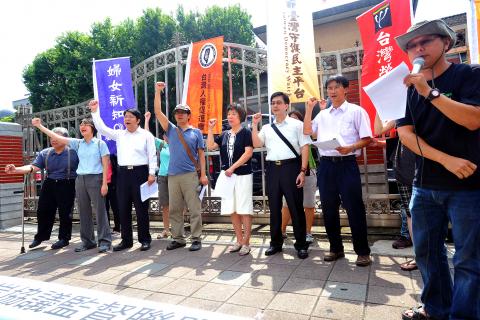|
Groups call for
action on service pact
RUSHED: Groups opposed to the service trade deal
said it must be reviewed thoroughly and voiced concern over using extra
legislative sessions to pass controversial bills
By Chris Wang / Staff reporter

Representatives from civic groups
gather at the gates of the Legislative Yuan in Taipei yesterday, calling for
public hearings to be held on the cross-strait service trade agreement before it
is reviewed by the legislature.
Photo: CNA
The legislature should not review the
recently signed cross-strait service trade agreement during an extra session
until a comprehensive impact assessment has been made, civic groups said
yesterday as they warned Chinese Nationalist Party (KMT) lawmakers against
forcing through ratification of the controversial agreement.
“We oppose the Ma Ying-jeou (馬英九) administration’s inappropriate use of extra
legislative sessions as well as the hasty passage of the service trade
agreement,” National Taiwan University professor Yen Chueh-an (顏厥安), who is also
a spokesperson for Taiwan Democracy Watch, told a press conference in front of
the Legislative Yuan in Taipei.
The pact was signed without significant assessment of its impact on hundreds of
local service-sector businesses and the livelihoods of up to 5 million
Taiwanese, said the groups, which included the Taiwan Labor Front, Citizen’s
Congress Watch, Cross-Strait Agreement Watch (CSAW) and the Taiwan Association
for Human Rights.
Despite these concerns, the KMT has decided to place a review of the agreement
on the agenda for the second extra legislative session, which begins on July 29,
and aims to have the pact ratified.
The alliance of civic groups called for lawmakers to oppose the use of the
second extra session to ratify the cross-strait deal. They also urged the
government to hold public hearings for as many service subsectors as possible
before sending the agreement to the legislature, saying that the process of
submitting the pact directly for a second reading was too rushed.
During the past five years Ma has repeatedly attempted to evade legislative
monitoring and has become accustomed to placing controversial major policies on
the agenda of extra legislative sessions rather than regular sessions, said
Chang Chia-yin (張嘉尹), a law professor at Shih Hsin University.
“Such practices are borderline unconstitutional,” Chang said.
As the Ma administration appears to have turned a blind eye to public concerns
over the service agreement, the groups are set to launch a series of measures
targeting KMT lawmakers, who would play a deciding role in the fate of the
agreement in the legislature.
The groups plan to contact the offices of all KMT lawmakers and ask them to join
the three opposition parties’ petition to boycott the second extra session, CSAW
spokesperson Lai Chung-chiang (賴中強) said, adding that the groups would visit KMT
caucus whip Lai Shyh-bao (賴士葆) today to appeal for support.
The groups also called on businesses in the 26 service subsectors which are most
likely to suffer most under the agreement, such as food vendors, beauty parlors
and printing firms, to make telephone calls to the offices of 19 selected KMT
lawmakers to voice their opposition to the pact.
The 19 KMT lawmakers are those who won office in January last year by less than
10 percent of the total votes, which means that their re-election chances are
likely to be at stake if they ignore public concerns, Lai said.
Academics from the groups said the cross-strait agreement is unfair and lacks
sufficient consultation and preparation, which has led to strong public
suspicion about its impact.
The government conducted item-by-item reviews of local agricultural products
ahead of Taiwan’s accession to the WTO, but such preparations were absent in the
negotiations for the service trade pact, said Chen Chi-chung (陳吉仲), an economist
at National Chung Hsing University.
In addition, the pact is unfairly weighted regarding the opening up of market
access, with Beijing’s liberalization coming with preconditions or limits
attached, National Taiwan University economist Jang Show-ling (鄭秀玲) said.
|
![]()
![]()
![]()